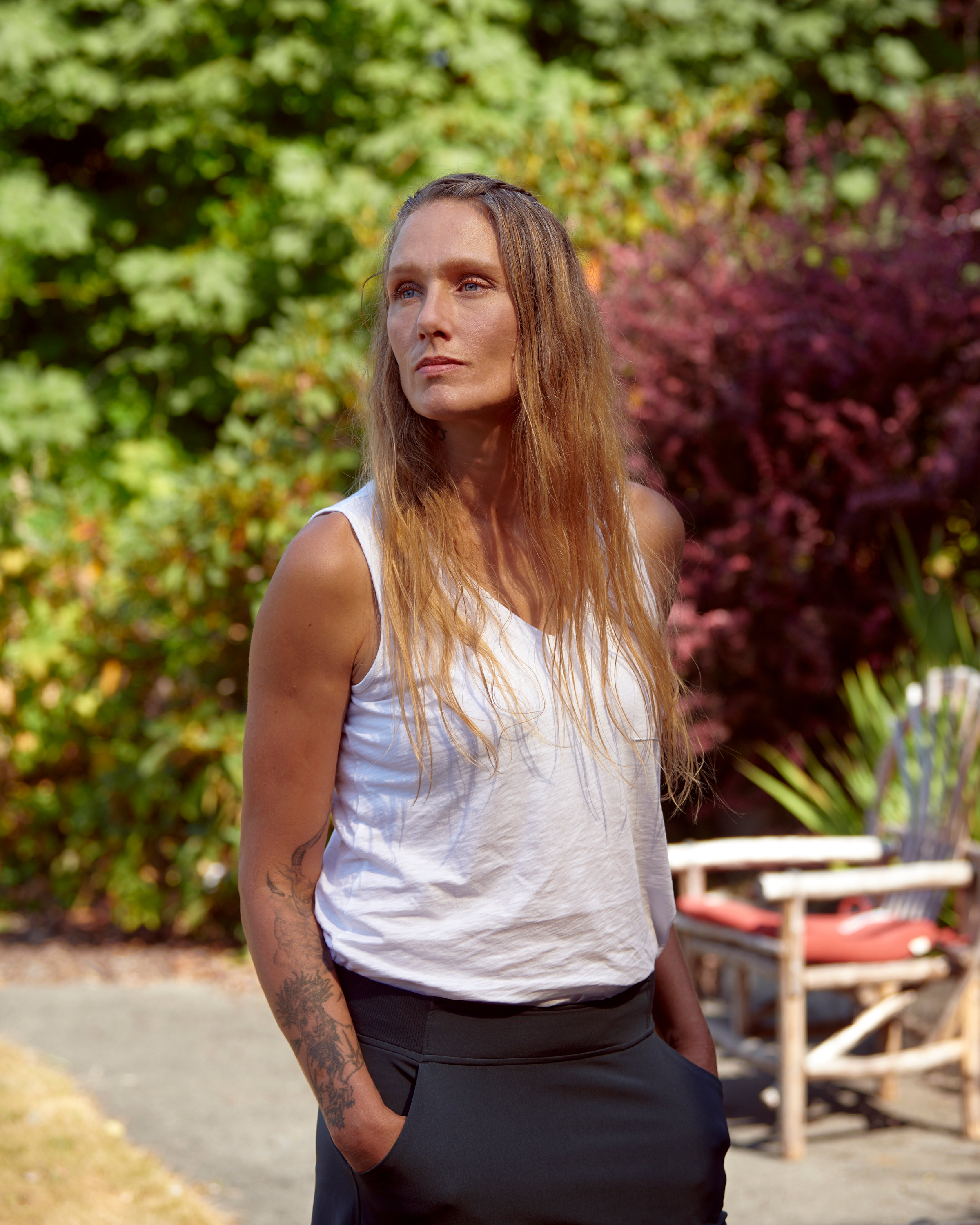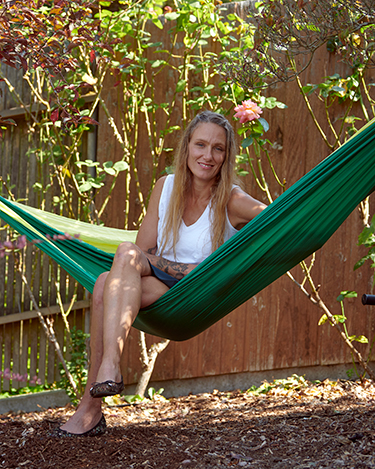After prison: A future in the law After prison: A future in the law After prison: A future in the law
After multiple incarcerations, Ginny Burton has become a top scholar. “My potential goal is to be a prosecutor, because I want reform in that area,” she says.
By Omari Amili | Photos by Meron Menghistab | December 2020

This is part of our “After Prison” series of interviews by Omari Amili. Go here to see all of the stories.
Ginny Burton, a mother of three and a first-generation college student, has her sights set on becoming an attorney. Despite a trauma-filled upbringing that led to her being incarcerated multiple times, she has become a 2020 Truman Scholar, a highly competitive $30,000 graduate school scholarship. She is also a Martin Honor Scholar and has earned a total of $74,000 in scholarship.
Omari Amili: You had parents who were addicted to drugs. When you were really young, they were doing robberies together, and this became a cycle for you later on. Can you speak a little bit about how these things are generational? Your child was incarcerated, as well.
Ginny Burton: People function in patterns. If we don’t have any kind of perspective to look at beyond our own, it’s really easy to fall into the trap of teaching what we know. It’s almost like having blinders on. I think my parents did the best they could with what they knew. There was definitely some mental illness there, and some addiction. I was taught the same thing that they knew, period. When my dad got out of prison, he never came back. But my mom and I, unfortunately, were using (drugs) together. We were in prison together two times. I think she taught me what she knew how to teach me. And so, I tried do the exact opposite, and not impact my kids with my lifestyle. And their lives were still impacted.
My 28-year-old son served prison sentence for something he did as a juvenile. They charged him as an adult. He doesn’t have the same kind of issues, but stuff happened in foster care because that’s where they ended up growing up. So they were impacted. It’s definitely a cyclical problem, which I’m currently trying to break with him. His sister is in active addiction, not to the extent that I was, but she’s destructive to herself. So my lifestyle, even though she wasn’t directly exposed, still impacted her, and she’s dealing with things the same exact way. It’s scary. I’ll continue to assess that process as the years go by.
I talk to my kids very openly about what my life looked like, you know, because I don’t want them to follow down my path. It’s a painful path. I don’t wish it on anybody. I’m grateful for it in my life, but it wasn’t fun and it wasn’t easy. Some days I’m surprised that I’ve actually made it through. I try to live really steady. I’ve learned that strength comes from being able to put one foot in front of the other day after day, regardless of what’s in front of you.

“I think that there needs to be a different kind of awareness when prosecuting crimes.”
Ginny Burton
Amili: We have a lot of similarities in our upbringings. I remember having drug busts at my house, police coming in there with guns drawn, and it’s the scariest thing in the world for a little kid. In what ways do you think that impacted you, or the set the stage for things that would happen later?
Burton: It started to prepare me to be comfortable in that kind of environment. I had a gun held to my head by my dad’s crime partner who came in to threaten my mom’s life. I think that I just started to become accustomed to what living in the underbelly was, you know, having your life threatened in a number of different ways. And I think that was the beginning of my desensitization.
Amili: You were bright kid and you actually had a vision for your life despite all that, but obviously, there were some things that took place that led to using drugs. What happened?
Burton: My mom was the first person to ever get high with me. There were seven kids in my family. And she had this plan to smoke weed, her and my brothers. I really didn’t want to because I knew my dad went to prison for drugs. I come from a family where people just aren’t nice. And I was really sensitive as a kid and got picked on a lot, and I was pretty much harassed into it. They wanted to make sure that I wasn’t going to tell, and so if I did it, too, the likelihood of me telling was a lot was a lot slimmer.
I thought I had destroyed my opportunities to practice law in any kind of way. I started training dogs when I was in prison, from 1997 to 2000. And I really liked that. When I got out of prison that time I started managing a doggy daycare and boarding kennel. I was clean for a little while. When I was in prison, I was training dogs for people with physical disabilities. I knew I liked to be of service. Helping other people was really important to me. After I got out, though, I was doing private training for average people, and the allure of working with dogs was lost for me because these were just people spending money. They didn’t really care about what was going on with their dogs.
I worked in the trades for a while. I was good at it, but that wasn’t really where my heart was. When I got out in 2012 or 2013, I started working in social services. I quickly moved up into supervising a number of programs. When I started school, I didn’t necessarily think that there was a potential for me to practice law. It wasn’t until the last maybe nine months that I recognized that it was possible, and then I had people in my life that might be able to help make that happen.
Amili: You said that by seven or eight years old, you wanted to be an attorney. What inspired you to finally pursue law as an adult?
 Burton: I have a couple friends, like Tarra Simmons, who were able to open a door that made me think that it might be possible for me (Editor’s note: Simmons just became the first formerly incarcerated person elected to the Washington State Legislature). I have a bunch of friends that are attorneys and one in particular, Amanda Dubois, consistently encourages me to shoot for the stars. She says, “Don’t worry about then, just worry about now. Take the steps to move forward.”
Burton: I have a couple friends, like Tarra Simmons, who were able to open a door that made me think that it might be possible for me (Editor’s note: Simmons just became the first formerly incarcerated person elected to the Washington State Legislature). I have a bunch of friends that are attorneys and one in particular, Amanda Dubois, consistently encourages me to shoot for the stars. She says, “Don’t worry about then, just worry about now. Take the steps to move forward.”
Ultimately, the thing that really propelled me was being present for my husband’s case. I was like, first of all, if he does do a life sentence, that’s ridiculous. It’s unwarranted, right? Then if he does go to prison for any amount of time, he’s not getting any help; he’s gonna walk out this same dude. And I have to do something about this. And then it went beyond him. What about the other 18,300 and some odd people that are in prison in Washington? It made me feel like I need to be a lawyer, and that it’s possible.
Amili: Five years from now, what does life look like?
Ginny Burton: I don’t know how driven I am to be in a courtroom. I’ll be really honest with you, I’m about to sound horrible, I’m sure, but my potential goal is to be a prosecutor, because I want reform in that area. I think that there needs to be a different kind of awareness when prosecuting crimes. There are a lot of crimes I don’t want to defend. The goal is to be an elected official. I am really disheartened by politicians on both the national state and local levels.
Omari Amili: I don’t think it’s horrible that you want to be a prosecutor. Obviously with my life experiences I have had negative experiences with prosecutors. They wanted to give me decades in prison my first time in jail. I was convicted on 30 felonies my first time in jail, with no plea agreements or anything. But that’s why we would need people like you saying, “No, what you guys are asking for is not OK.” It’s important to have people like you in those roles.
Ginny Burton: And that’s exactly why I want to look at prosecution, because a lot of what prosecutors do is ridiculous. It doesn’t make sense. It’s not founded in reality. We have a contradictory system, and I think that we need lived experiences in every area of government.